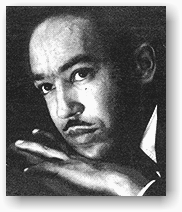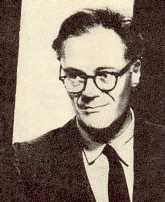Why Study American Literature?
1. Literature reflects human ideas, beliefs, and societies.
This is so fundamentally obvious that we tend to overlook it. Literature is diverse in its portraits of life and its claims about the world. Why take the time to read it then? Because humanity is valuable. The Christian understanding of human life is one that stresses its inherent value and worth. Roger Lundin writes:
"The doctrines of Creation and Incarnation affirm that human life is inherently meaningful. God has placed us in a world filled with order and hints of wonder, and through his acts of revelation and redemption, he has entered into our history. As a result, although some things are obviously of greater importance than others, everything in our own experience has significance, and our attempt to discern that significance -- as well as we can -- is part of our calling as God's servants." (5)
Christ's incarnation teaches us that God hallows the material and cultural world. Because God created the world and loved it enough to enter it, Christians too should love it and seek to understand it.


2. When we read literature, we discover common human ways of understanding life.
3. When we read literature, we also discover significant differences. This allows us to explore another’s message or life, even those separated from us by time and social barriers.
4. Literature is full of human reactions and reactions – in poems, essays, diaries, narratives, and in the characters of narratives. As we respond to and analyze these, we can gain a greater knowledge of the human psyche.
5. At the same time, we gain a greater knowledge of ourselves and our own responses because we most inevitably compare our lives to those in literature.
As we compare and contrast the views of authors not only with each other but also our own views and those of others, we deepen our sense of human reactions and our own self-responses. We have the possibility of becoming deeper, more self-aware people.
6. When we do this, we have the opportunity for discovering pride in our community and culture, for gaining respect for another’s, and for learning humility as we interact across cultures.
Yet being deeper and more self-aware requires certain virtues, in particular, a sense of respect and humility. Good dialogue requires faith, hope, and love: faith that communication can actually take place between people; hope that something may come of our efforts; and love for our fellow human beings in all their diversity, complexity, and variety.
7. We don’t always agree with what we read, or we agree in part. We read literature to test the truth of a message against our worldview.
8. We can cultivate wisdom; learn of good and evil; and experience the call to justice. Literature can not in itself make us a better person, but it can assist us in that quest.
Wisdom can be defined as skill in living. By examining literary texts, their stories and their messages, we can increase in our understanding of how to live life. We learn how to discern what is healthy and destructive in the world, and we are challenged with injustice and its consequences. Literature may even challenge us to ask what we will do to help end the problems it pictures.
9. Literature offers us the beauty of words and stories, and as such, reflects the glory of God present in language, narratives, and the stuff of creation.
As a Christian, I believe that not only is God the final source of all truth and all goodness but that God is also the final source of all beauty. Part of being fully human under God is rejoicing in the wonder and joy that songs and stories and language can bring to our lives.
10. Literature can entertain us.
Leland Ryken writes:
What constitutes a worthwhile use of leisure time? There is no one right answer. . [But] literature has much to commend it as a leisure activity. In a day of mindless leisure pursuits, literature stands out by engaging our mind . . . . It enriches our life by making us aware of the world of human experience and human fears and longings . . . We can upgrade the quality of our leisure time by learning to value what is excellent rather than mediocre. (69-70)
Our use of our leisure is an extension of God's sabbath principle. God rested on the seventh day, not because he needed to, but in order to teach us the value of existence. God has created us to enjoy things. Times of rest and pleasure are not laziness but times of celebration.
11. Literature can offer us cultural literacy. Literary figures, plots, motifs, movements, and genres are a vital part of our cultural heritages.
One frequent question that students often ask: "Well, why are these works considered so important?" Louise Cowan has suggested the following seven reasons for why a text is considered a classic:
- The classics not only exhibit distinguished style, fine artistry, and keen intellect but create whole universes of imagination and thought.
- They portray life as complex and many-sided, depicting both negative and positive aspects of human character in the process of discovering and testing enduring virtues.
- They have a transforming effect on the reader's self-understanding.
- They invite and survive frequent rereadings.
- They adapt themselves to various times and places and provide a sense of the shared life of humanity.
- They are considered classics by a sufficiently large number of people, establishing themselves with common readers as well as qualified authorities.
And, finally, their appeal endures over wide reaches of time. (21-22)
12. American literature in particular is associated with Christian faith and Christendom's influence on American culture.
It is impossible to read the works of Jonathan Edwards, Emily Dickinson, or Kathleen Norris without being aware of Christian ideas, principles, and questions.
13. American literature is haunted by questions of faith and doubt. These continue to form the subtext of the literary experience.
Even when their Christianity is not explicit, it is deeply enriching to read the works of John Updike, Denise Levertov, and Louis Erdrich with their faith in view.
14. Literature can open us to our own latent interests and talents; we may even discover part of our vocation from God.
Frederick Buechner has noted that "the place God calls you to is where your deep gladness and the world's deep hunger meet." For some of us, the study of literature plays a part in this calling. Literature can challenge us to grow as individuals and as communities, and for that, it is worth spending time with.
Works Cited
Cowan, Louise and Os Guinness. Invitation to the Classics. Grand Rapids: Baker, 1998.
Gallagher, Susan V. and Roger Lundin. Literature Through the Eyes of Faith. NY: HarperCollins, 1989.
Ryken, Leland. Windows to the World. Dallas: Probe, 1990.
